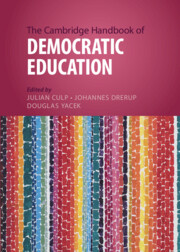Book contents
- The Cambridge Handbook of Democratic Education
- Cambridge Handbooks in Education
- The Cambridge Handbook of Democratic Education
- Copyright page
- Contents
- Contributors
- Acknowledgments
- Introduction
- Part One Historical Perspectives
- 2 Plato on Democratic Education
- 3 Aristotle on Education, Democracy, and Civic Friendship
- 4 Rousseau on Democratic Education
- 5 Dewey on Democratic Education
- 6 Hannah Arendt on the Very Possibility of Democratic Education
- 7 Paulo Freire on Democratic Education
- 8 Rabindranath Tagore on Democratic Education
- Part Two Philosophical and Normative Foundations
- Part Three Key Topics and Concepts
- Part Four Challenges
- Index
- References
4 - Rousseau on Democratic Education
from Part One - Historical Perspectives
Published online by Cambridge University Press: 20 April 2023
- The Cambridge Handbook of Democratic Education
- Cambridge Handbooks in Education
- The Cambridge Handbook of Democratic Education
- Copyright page
- Contents
- Contributors
- Acknowledgments
- Introduction
- Part One Historical Perspectives
- 2 Plato on Democratic Education
- 3 Aristotle on Education, Democracy, and Civic Friendship
- 4 Rousseau on Democratic Education
- 5 Dewey on Democratic Education
- 6 Hannah Arendt on the Very Possibility of Democratic Education
- 7 Paulo Freire on Democratic Education
- 8 Rabindranath Tagore on Democratic Education
- Part Two Philosophical and Normative Foundations
- Part Three Key Topics and Concepts
- Part Four Challenges
- Index
- References
Summary
In Emile, Jean-Jacques Rousseau describes the education of a fictional student who follows his interests and discovers facts by problem-solving. Rousseau’s educational philosophy was embraced by child-centered progressives committed to advancing a distinctively democratic conception of education. They believed that Rousseau outlined principles for forming autonomous and independent citizens – precisely the kind of citizens ready to meet the demands of democratic self-government. In other works, however, Rousseau calls for a system of public schooling that forms patriots. He writes that education “must give souls the national form, and so direct their tastes and opinions that they will be patriotic by inclination, passion, necessity.” Can this authoritarian approach to education be reconciled with the laissez-faire principles of Emile? Should either of these educational visions be called democratic? This chapter offers answers to those questions and argues that, ultimately, both approaches aim to improve how citizens relate to one another.
Keywords
- Type
- Chapter
- Information
- The Cambridge Handbook of Democratic Education , pp. 45 - 60Publisher: Cambridge University PressPrint publication year: 2023

